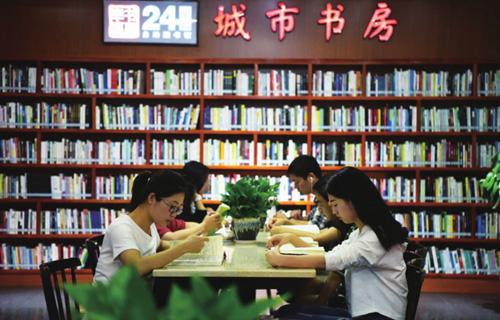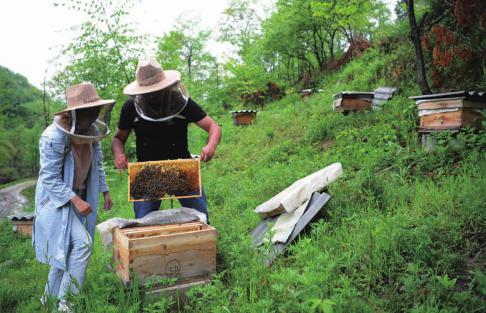Immersed in Knowledge
People read books at a 24-hour self-service library at the Sanxia Square in southwest Chinas Chongqing Municipality on April 19. About 8,000 books are available for readers at the library.
Internet Addiction
Chinese primary and middle schools were asked to take action to prevent students from becoming addicted to the Internet, the Ministry of Education said on April 24.
Schools were urged to enhance students awareness of violent and vulgar online content and the negative impact of online games, as well as to provide assistance and guidance for students who show signs of addiction to such content or games, the ministry said in a press release.
The management of Internet access within schools should be tightened and the use of mobile phones by students should be regulated, it said. In addition, the ministry published an open letter to parents, calling on them to be more aware of this issue and to intervene more effectively.
Li Mingxin, the principal of Beijing Primary School, said that the policy is very important and much needed.
Admitting that use of mobile phones and easy access to the Internet have caused problems among some students, Li said the ministry policy supports the disciplining of students using mobile phones.
Going Digital
The Ministry of Human Resources and Social Security issued the countrys fi rst social security electronic certifi cate on April 22, at the opening of the Digital China Summit in Fuzhou, capital of southeast Chinas Fujian Province. The e-certifi cate, which is applicable nationwide, con- tains all the digital functions of the current e-card, including self-service enquiry and e-payment functions.
The offi cial launch builds on an earlier pilot program in Chinese cities such as Fuzhou and Qingdao, where local governments allowed users of Alipay, Alibabas third party online payment service platform, to pay for social security.
Alipays mobile phone app confi rms a users identity through a facial recognition system. The user can then get a QR code to make medical payments more swiftly and conveniently.
Zhai Yanli, head of the information center with the ministry, said at the summit that the e-certifi cate has adopted a number of safety measures including an electronic information certifi cation process and artifi cial intelligence-facilitated Internet security methods to confi rm the holders identity.
Fuzhou and Qingdao will be among the fi rst cities to launch the social security e-certifi cate on a trial basis.
By the end of March, Chinas social security system covered 1.12 billion citizens, or 80.6 percent of the total population, according to the ministry. The system has been widely used in medical services, elderly care and employment.
Rural Power Grid
East Chinas Shandong Province will invest 300 million yuan ($47.6 million) this year to construct and upgrade the power grid in povertystricken areas.
A total of 646 impoverished villages will benefi t from the project, according to State Grid Shandong Electric Power Company.
The fund will be used to provide a more stable power supply for people living in poor areas so they can develop agriculture and promote rural tourism.
To address problems like low voltage and insuffi cient supply, the Central Government started electricity power grid upgrades in rural areas in 2016 to ensure stable nationwide coverage by 2020.
By the end of 2017, China had upgraded the power grid in 78,533 villages, according to the National Energy Administration.
Seizing Cocaine
Police in Shenzhen, south Chinas Guangdong Province, have detained 10 suspects and seized 1.3 tons of cocaine worth over 1 billion yuan ($158 million), according to the public security department of Guangdong on April 24.
The police received a tip-off in July 2017 and set up a task force to investigate. In August 2017, they arrested fi ve suspects and confi scated 40 kg of cocaine in a residential area in Shenzhen.
Following interrogations, the police captured three more people who attempted to smuggle 1,291 kg of cocaine into the country via Guangzhou, capital city of Guangdong, in February.
The investigation revealed that they had taken orders from two other suspects who transported the drugs from South America. The two fl ed abroad but were extradited in March.
IPR Protection
China will better protect intellectual property rights (IPR) to improve the business environment and attract more foreign investors, a top IPR offi cial said on April 24.
China treats IPR owned by domestic and foreign companies the same, and gives them equal protection, Shen Changyu, head of the State Intellectual Property Offi ce, said at a press conference held by the State Council Information Offi ce, adding that China adopted the AntiUnfair Competition Law last year.
Chinese courts settled 203,000 IPR related cases in 2017, up 38.38 percent from a year earlier. A total of 7,157 people were charged. Police also investigated 17,000 cases related to IPR violation or the making and selling of counterfeit products, which involved a combined sum of 6.46 billion yuan ($1.02 billion).
The peoples approval rating of the states stricter IPR protection rose to 76.69 percent last year, Shen said, citing a survey.
In 2017, China submitted 1.38 million invention patent ap- plications, leading the world for the seventh straight year. It presented 51,000 Patent Cooperation Treaty applications, ranking second in the world; and 4,810 Madrid Protocol trademark applications, making it third in the world.
Shen said China strengthens IPR protection not only because it is an international obligation but also because the countrys development demands it.
He said IPR protection will improve in areas including rights authorization, administrative enforcement, judicial protection, arbitration and sector self-regulation.
Database for Antiques
The State Administration of Cultural Heritage (SACH) launched a database for stolen foreign antiques on April 20, to prevent them from entering and circulating in China.
The administration asked entryexit examination offi ces to intensify their supervision over stolen foreign antiques.
It also called on professional institutions, practitioners and the public to check the database from time to time to avoid the purchase or sale of such items.
The damage to cultural heritage has become a common challenge for the international community and the stealing and traffi cking of antiques has damaged the historical and cultural legacy of many countries, the SACH said in the statement.
In 2017, the administration joined with the Ministry of Public Security in a similar platform for stolen Chinese antiques.
Since 2008, the SACH has made public information on over 6,900 stolen foreign antiques.
Earth Day
Children and their families take part in a drawing activity with the theme of earth protection at a stadium in Donghai County, Lianyungang, east Chinas Jiangsu Province, on April 19. Many schools in China hold Earth Day-themed drawing activities to welcome the event, which is celebrated annually on April 22.
Tourism Regulation
Chinas Ministry of Culture and Tourism will continue to regulate the tourism market and will take stronger action against nationwide problems, the ministry said in a statement on April 19.
Based on protecting the rights of tourists, it will target prominent issues in the tourism sector such as fraudulent low-priced tours and compulsory consumption, among others.
According to the statement, the ministry began a campaign with fi ve inspection groups going to popular tourist destinations to straighten out irregularities in the fi rst three months of this year.
The inspection covered more than 11,000 tour companies, 8,600 tour guides, over 2,900 tour groups and 800 vehicles, with 172 cases fi led and 70 tour guides and illicit practitioners punished.
Flying High
People fl y kites during an international kite festival held in Weifang, east Chinas Shandong Province, on April 21. Over 2,000 kite-fl ying enthusiasts from 57 countries and regions took part in the event.
Opposing Protectionism
Several members of the World Trade Organization (WTO) on April 23 expressed their concern and disappointment with the recent decision by the United States to impose tariffs on imports of steel and aluminum products, during a meeting of WTO Safeguards Committee.
Seven WTO members—including Russia, India, Venezuela, Turkey, Norway, Switzerland, and Singapore—joined China, which raised the matter, in expressing their respective concerns over the U.S. tariff decision under Section 232.
China warned that the Section 232 actions severely damage the stability of the multilateral trading system and distort international supply chains, with considerable negative effects.
China said the U.S. decision to exempt certain exporters from the tariffs, including some of the largest suppliers to the U.S. market, clearly violated the WTOs most favored nation principle.
Russia noted that the whole process leading up to the imposition of tariffs lacked transparency and deprived foreign producers of the right to provide evidence in the hearings.
The U.S. actions only cause instability in trade, lead to increased trade barriers, and create a loselose situation for all members, said Russian delegates.
Turkey suggested that the G20s Global Forum on Steel Excess Capacity provide a venue to discuss the problem of excess capacity, saying such problems should be resolved through coordinated efforts rather than unilateralism.
Auto Boom
Technicians work on an assembly line at Beijing Hyundais Cangzhou factory in Hebei Province on April 25.
In 2017, the added value of the automobile and related industries in Cangzhou increased to 12.25 billion yuan ($1.94 billion) amid the Beijing-Tianjin-Hebei coordinated development drive.
Quotas Expanded
China will increase quotas for two pilot schemes that allow domestic investors to access foreign assets, as part of broader efforts to open up the fi nancial market, according to the countrys foreign exchange regulator.
The quota for the Qualifi ed Domestic Limited Partnership(QDLP) program in Shanghai and the quota for the Qualifi ed Domestic Investment Enterprise (QDIE) program in Shenzhen will be expanded to $5 billion each, the State Administration of Foreign Exchange(SAFE) said on April 24 in an online statement.
The QDLP program was fi rst launched in Shanghai in 2013 while QDIE was launched in Shenzhen in 2014. Both schemes offer channels for qualifi ed domestic institutions to invest overseas.
China launched a new round of the programs late last year. The QDLP program in Shanghai had a previous quota of $2 billion, which was used up by the end of February, according to the SAFE.
The QDIE program in Shenzhen had a previous quota of $2.5 billion,$1.26 billion of which had been allocated by April 9 this year.
The SAFE will steadily push forward the pilot programs and improve the macro-prudential management of the schemes, the statement said.
Earlier, the SAFE stated that the country will also push forward the reform of the Qualified Domestic Institutional Investor program, a similar scheme for outbound investment.
Didi Auto Alliance
Chinese ride-sharing giant Didi Chuxing has partnered with 31 auto industry fi rms to build an integrated car operator platform, the company announced on April 24.
Domestic and foreign fi rms, like BAIC, Bosch, BYD and Toyota, joined the Didi Auto Alliance, which brings together the resources and strengths of Didi and 31 founding partners from areas of original equipment manufacturing, parts and components manufacturing, electric vehicle(EV) services and digital mapping.
Key areas of cooperation include auto sales and leasing, services, fi nance, fl eet operation and car-sharing, and co-development of vehicles and industry standards.
Cheng Wei, Didi founder and CEO, said the alliance aims to embrace the upcoming transportation revolution as the future auto industry will be driven by coordinated advances in new energy vehicles, intelligent driving technologies and shared mobility modes.
Didi will leverage its big-data analysis, business scale, operational expertise and network resources to develop with partners integrated auto solutions on car leasing, sharing and after-sales service platforms, Cheng said.
The alliance will explore designing and making a new-generation EV car custom-made for safer and smarter ride-sharing services.
Didi now provides up to 30 million daily rides for passengers. It plans to have 10 million EVs on its platform by 2028.
Rural Rejuvenation
A farmer picks cherries at a Liuzhi-based industrial poverty alleviation base in Guizhou Province on April 24.
With a total investment of 300 million yuan ($47.4 million), the base features the integration of special agriculture and rural tourism. The 1,230 rural families that participate in the operation have seen their annual income increase by 7,460 yuan ($1,179) per household.
SOE Reform
Almost all of Chinas centrally administered state-owned enterprises(SOEs) have been transformed into limited companies or corporations, according to the countrys top SOE regulator.
Chinas central SOEs were once publicly owned, without shareholders. The corporation system introduces shareholders, which helps defi ne operation responsibilities and make enterprises into independent market economy players.
A majority of the 60-plus central SOEs and about 2,500 central SOE subsidiaries have fi nished or are undergoing transformation.
“This is a historic breakthrough in Chinas SOE reform. It paves the way for further reforms such as equity diversifi cation and mixed ownership,” said Peng Huagang, spokesperson for the StateOwned Assets Supervision and Administration Commission of the State Council (SASAC).
The reform helped trim over 8,300 redundant central SOE branches and saved management capital worth 13.5 billion yuan ($2.14 billion), SASAC data showed.
New Train Deal
Chinas rolling-stock maker CRRC Corp. has secured a train deal for 200 cars and related parts from Argentina, the third train order won from the country, a CRRC-affi liated company said on April 24.
The contract worth $278 million was signed between CRRC Sifang Co., Ltd. and the Argentine Ministry of Transport, according to a statement from CRRC Sifang.
Delivery of the cars for the Roca Line in Buenos Aires will start in mid-2019, the statement said.
The cars, which will be operated with 300 previously delivered cars, will help increase the transport capacity by 20 percent, according to the statement.
In 2013, China South Railway(CSR) won a contract worth $1 billion to provide 709 carriages to renew Argentinas commuter system.
CSR and China North Rail merged to become CRRC Corp. in 2015.
Busy as a Bee
Beekeepers work at a breeding base for bees in Jieguanting Town, Lueyang County, Shaanxi Province, on April 24.
Taking advantage of favorable environmental resources, Jieguanting has been committed to developing the beekeeping industry. As a result, 465 impoverished households have seen a steady increase of income.
Cheaper Medicine
China will exempt import tariffs on 28 drugs including all cancer medication from May 1 to fulfi ll its pledge of opening the Chinese market wider, the Ministry of Finance (MOF) announced on April 23.
The announcement followed a statement released after an execu- tive meeting of the State Council on April 12 that import tariffs on all common drugs including cancer drugs, cancer alkaloid-based drugs and imported traditional Chinese medicine will be exempt from May 1.
“The authorities will reduce the prices of cancer drugs through centralized government procurement and eliminate premium prices for drugs by means of cross-border e-commerce. Imported innovative drugs, especially much-needed cancer drugs, will be incorporated into the catalogue of medical insurance reimbursement,” the statement said.
The measures will signifi cantly enhance the availability and inclusiveness of the drugs and reduce the burden of patients, according to the MOF. They will also help maintain an open and inclusive multilateral trade system and enable more people to share common prosperity.
According to the National Cancer Institute, the market for antineoplastic drugs in China exceeds 120 billion yuan ($19.1 billion). However, they are usually too expensive for working class families.

